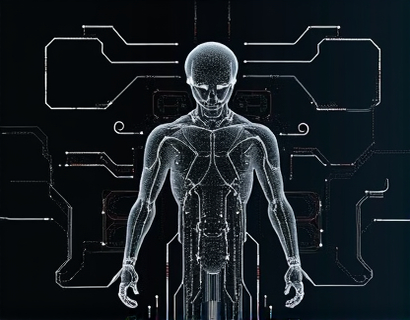Elevating Tech Careers through AI Certification Dynamics
The digital age has ushered in a new era of technological advancements, particularly in artificial intelligence (AI). As AI continues to transform industries, the demand for skilled professionals who can navigate and leverage these technologies has surged. In this context, AI certification has emerged as a pivotal tool for tech professionals and students aiming to enhance their career prospects and educational credentials. This article delves into the dynamics of AI certification, exploring how specialized digital accreditation can significantly elevate tech careers.
In the rapidly evolving tech landscape, traditional degrees and certifications, while still valuable, may not suffice to demonstrate specific skills and knowledge in AI. This is where AI certification platforms play a crucial role. These platforms offer specialized credentials that validate an individual's skills and knowledge through a combination of completed tasks and educational milestones. By obtaining such certifications, tech professionals can enhance their professional credibility and significantly improve their job prospects.
Understanding AI Certification
AI certification is a formal recognition of an individual's expertise in AI technologies and applications. These certifications are designed to assess a candidate's ability to apply AI concepts, tools, and techniques in real-world scenarios. Unlike general tech certifications, AI certifications focus on specific areas such as machine learning, natural language processing, robotics, and more. This specialization ensures that certified individuals possess in-depth knowledge and practical skills in their chosen AI domain.
The process of obtaining an AI certification typically involves completing a series of courses, projects, or assessments. These evaluations are designed to test both theoretical understanding and practical application. For instance, a candidate might need to build a machine learning model from scratch, implement a natural language processing algorithm, or develop a robotic system. By successfully completing these tasks, candidates demonstrate their competency in AI, making them more attractive to potential employers.
Benefits of AI Certification for Tech Professionals
For tech professionals, AI certification offers numerous benefits. Firstly, it validates their skills and knowledge in a way that is recognized across the industry. Employers increasingly look for certified professionals as they provide assurance of a certain level of expertise. This can lead to better job opportunities, higher salaries, and faster career advancement.
Secondly, AI certification enhances educational credentials. In a field where continuous learning is essential, certifications serve as tangible proof of an individual's commitment to staying updated with the latest AI trends and technologies. This is particularly valuable for those looking to transition into AI-related roles or for experienced professionals seeking to upskill.
Moreover, AI certification can boost confidence and self-assurance. By achieving a certification, professionals gain a sense of accomplishment and a clear benchmark of their abilities. This can be especially motivating in a field that is often perceived as challenging and complex.
Career Development through AI Certification
AI certification is not just about immediate job prospects; it is a long-term investment in career development. In the dynamic tech industry, staying relevant requires continuous learning and adaptation. AI certifications provide a structured pathway for professionals to keep their skills sharp and up-to-date.
For those early in their careers, entering the field with an AI certification can open doors that might otherwise be closed. It can lead to internships, entry-level positions, or even direct employment in top tech companies. For mid-career professionals, certifications can serve as a springboard for career advancement, enabling them to move into more senior roles or specialized positions.
Additionally, AI certification can facilitate career transitions. With the growing importance of AI across various sectors, professionals from different backgrounds can leverage AI certifications to pivot into new roles. For example, a data analyst with an AI certification can transition into a machine learning engineer position, or a software developer can specialize in AI-driven solutions.
Specialized Credentials and Their Value
One of the key strengths of AI certification platforms is the offering of specialized credentials. These credentials are designed to validate specific skills and knowledge areas within the broad field of AI. For instance, a certification in deep learning might focus on neural networks, convolutional networks, and reinforcement learning, while a certification in AI ethics might cover bias, fairness, and transparency in AI systems.
These specialized credentials are highly valued because they demonstrate a deep and focused expertise. Employers are often looking for professionals who can tackle specific AI challenges, and certifications in these areas provide concrete evidence of that capability. Furthermore, specialized certifications can help professionals stand out in a competitive job market, as they highlight unique and valuable skill sets.
The Role of AI Certification in Education
AI certification is not limited to professionals already in the workforce. For students and learners, these certifications can be an integral part of their educational journey. Many AI certification programs are designed to complement academic curricula, providing practical, hands-on experience that complements theoretical learning.
For students pursuing degrees in computer science, data science, or related fields, AI certifications can enhance their learning experience and job readiness. These certifications offer real-world projects and assignments that simulate professional environments, helping students apply classroom knowledge to practical problems. This not only reinforces their understanding but also builds a portfolio of work that can be showcased to future employers.
Moreover, AI certifications can be a deciding factor for admissions into prestigious programs or research opportunities. A certification in a specialized AI area can demonstrate a student's dedication and competence, making their application more compelling. This can lead to better educational opportunities, scholarships, and research collaborations.
Challenges and Considerations
While AI certification offers numerous benefits, it is important to approach it with a clear understanding of the challenges and considerations involved. First, the AI landscape is rapidly evolving, and certifications must keep pace with the latest developments. This means that certifications need to be regularly updated and revalidated to remain relevant.
Another consideration is the quality and recognition of the certification. Not all AI certification programs are created equal. It is crucial to choose reputable and well-established platforms that offer recognized and respected certifications. Researching the accreditation body, reviewing curriculum content, and checking industry recognition are essential steps in this process.
Additionally, while certifications are valuable, they should be part of a broader skill development strategy. Continuous learning, practical experience, and networking are equally important for success in the AI field. Certifications provide a foundation, but ongoing professional development is key to staying competitive.
Maximizing Career Potential with AI Certification
To maximize career potential through AI certification, professionals and students should adopt a strategic approach. Here are some key steps to consider:
- Identify Career Goals: Determine specific career objectives and the AI specialization that aligns with those goals. This will help in selecting the most relevant certification.
- Research Certification Programs: Look for reputable platforms with well-structured programs that offer comprehensive coverage of the chosen specialization. Read reviews, check industry recognition, and evaluate the support provided by the certification body.
- Gain Practical Experience: Combine certification studies with hands-on projects and real-world applications. This practical experience is crucial for mastering AI concepts and building a strong portfolio.
- Network and Collaborate: Engage with the AI community through forums, meetups, and online platforms. Networking can provide valuable insights, mentorship opportunities, and potential job leads.
- Stay Updated: Follow industry trends, attend webinars, and participate in continuous learning to keep skills sharp and up-to-date.
By following these steps, individuals can effectively leverage AI certification to enhance their career prospects and educational credentials, positioning themselves as competitive and knowledgeable professionals in the tech industry.
Conclusion
In conclusion, AI certification is a powerful tool for tech professionals and students looking to elevate their careers and educational achievements. By validating specific skills and knowledge through specialized credentials, certifications enhance professional credibility and job prospects. Whether for career advancement, educational enhancement, or career transition, AI certifications offer a structured and recognized pathway to success in the dynamic field of artificial intelligence.










































